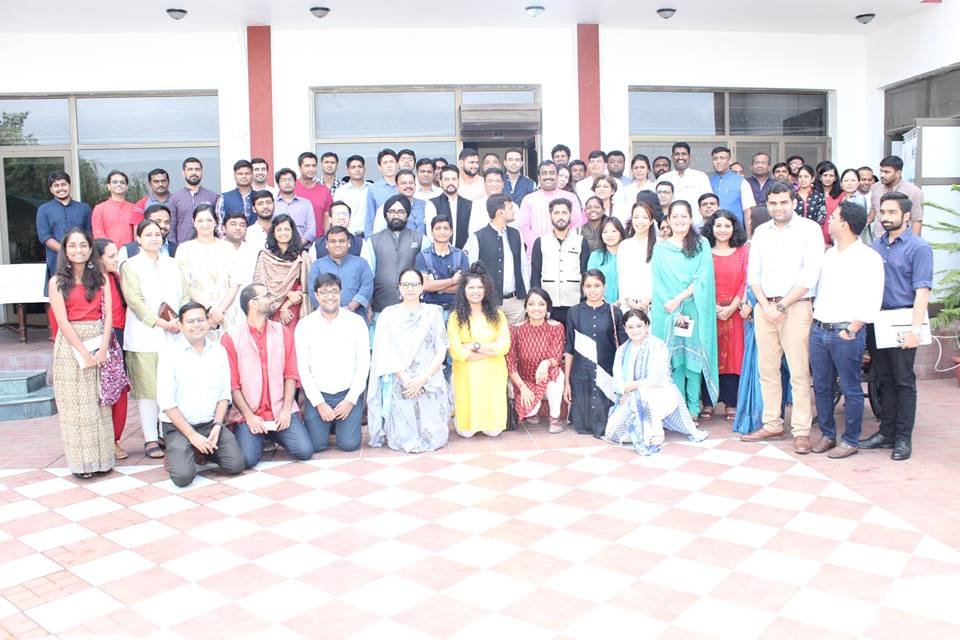7thYoung Thinkers Meet (YTM), an annual two day conclave of emerging young
thought leaders, was hosted by India Foundation on 28-29 July, 2018 at Kasauli, Himachal Pradesh.

In the inaugural session on “Defining New Age Leadership”,Shri Ram Madhav, Member, Governing Council, India Foundation said that leadership does not mean political leadership alone and that there are other forms of leadership like community, social and religious leadership. He also cited various areas of leadership like student, trade union, farmers, civil rights, human rights and media leadership. He welcomed emergence of young leadership in diverse areas. He spoke about how ideology can influence ideas and the need for having open mind for new ideas and having a grand vision.
Dr. Krishnagopal, Joint General Secretary of RSS said that India’s diversity is an unmatchable asset and that in India there is inclusiveness and willingness to walk together. He said that spirituality is in the genes of India and that India’s heritage is one of wisdom, kindness, ethics and sacrifice. He narrated the simplicity of Dr. Babu Rajendra Prasad, who after serving as the President of India, spent his retirement years in a two-roomed house in an ashram in Bihar. He also spoke about integrity and moral courage of Bipin Chandra Pal who being editor of a paper refused to disclose the name of a writer in his paper and took responsibility for the publication although the British had put him in jail for one year for the same. He also spoke about the simplicity of Lokmanya Bal Ganghadhar Tilak and his profound concern for fellow countrymen. He referred to the leadership role of Dr. Vikram Sarabhai in leading India’s space programme in the face of adversities and challenges. Quoting APJ Abdul Kalam, he narrated how Dr. Satish Dhawan took total responsibility in the face of adversities and let the then team leader Dr. Kalm address the media on successful mission launch.
In a session on “Youth Activism in India,” Shri V. V. Lakshminarayana, a former IPS officer explained what motivated him to take voluntary retirement from service in order to work in the areas of education and rural upliftment. Hinting that age is more an aspect of mind rather than body, he narrated the example of Shri Daripalli Ramaiah, a recent Padma Shree awardee, now aged about 81 years, hailing from Khammam District of Telangana, had single handily planted over one crore trees and how he even today at his advanced age daily collects hundreds of seeds for plantation. He narrated how Adi Shankaracharya did not hesitate to break rules of Sanyas in order to perform the last rites of his mother. Citing Lord Budha he said that it is better to find solution rather than merely criticise. He said that physical, emotional, intellectual, aesthetic and relationship wellbeing are pre-requisites for youth to be able social activists. He said that youth has got tremendous potential and that they must focus on entrepreneurship and agri-activism in order to herald transformation.
In a session on “Activism-based Politics at the Grassroots,” Ms. Roopa Ganguly, Member of Parliament (Rajya Sabha) from West Bengal said that although she entered politics at the age of 50 years, she has been doing social work from much earlier. She said that one of the fundamentals of grassroot politics is to stand against injustice. She said that leaders have to be accessible to karyakarthas round the clock and must lead from the front. She narrated challenging circumstances in West Bengal because of political violence unleashed by the ruling party and sometimes the partisan attitude of the police forces.

Shri Anurag Thakur, Member of Parliament (Lok Sabha) recollected how he despite being youngest president of BCCI got constructed, in short span of five years, seven stadiums in Himachal Pradesh including the one at Dharamshala, which is hailed as one of the most beautiful stadiums in the world. He referred to the importance of physical wellbeing and narrated his experience of starting and expanding mobile healthcare vehicles which are rendering great services in remote areas of Himachal Pradesh. He said that social and political movements result in emergence of new leaders. He recalled his experience of leading the moment to host the national flag in Kashmir. He also recalled how he as president of Bharatiya Janata Yuva Morch with brief planning and quick execution organised more than 2000 programmes all over the country against the then corrupt administration of UPA.
All the sessions included an interaction with the participants. Mr. Pema Khandu, Chief Minister of Arunachal Pradesh spoke about his experiences in politics and government and the tourist potential of Arunachal Pradesh. A mock parliament session witnessed active participation from the participants who were divided into various political parties with floor leaders. There were some interesting presentations – Mr. Shobhit Mathur and Mr. Sahil Agarwal made a presentation on ‘Making Young India Friends for Our Geostrategic Future”; Mr. Kishen Shastry KS on “Religious-Political Leadership: Rajaji’s pertinence today”; Ms. Temecula Imsong on “Leadership – A few experiments”; Mr. Amitabh Soni on “Bringing together the farmers, the labourers & students for social change – Learning from strategies devised on the ground”; Ms. Manoshi Sinha on “New Age Leadership in the Context of History”; Mr. Vishal Ajjampur on “Sport as a tool for Diplomacy and Socioeconomic Development”; Mr. Raghav Pandey on “The Need for Presidential form of Government; Mr. Akshat Goel on “New Product Development for the Emerging Economies”; and Mr. Praket Arya on “Are Leaders Born or Nurtured?”
(This report is carried in the print edition of September-October 2018 issue of India Foundation Journal.)




